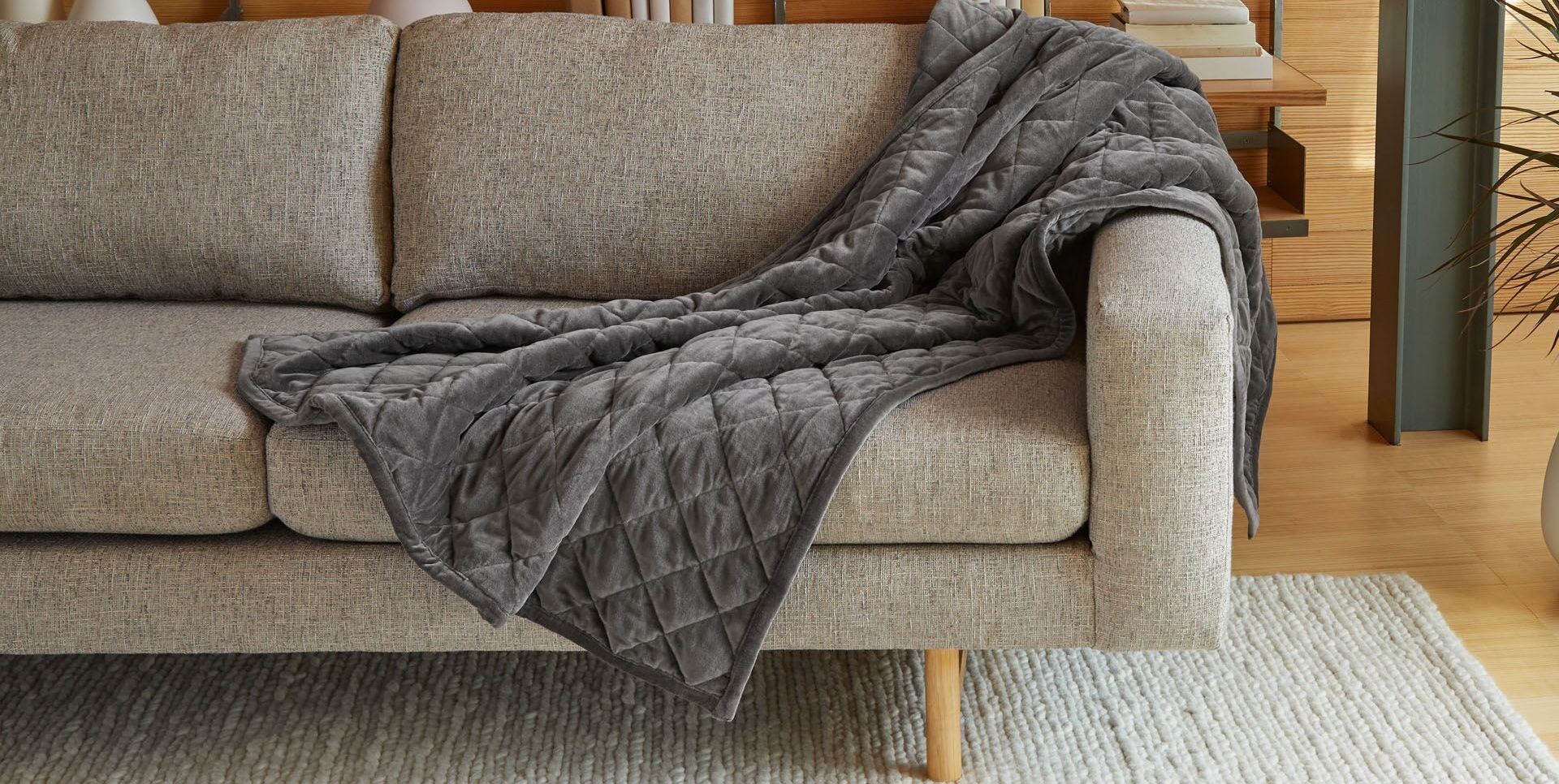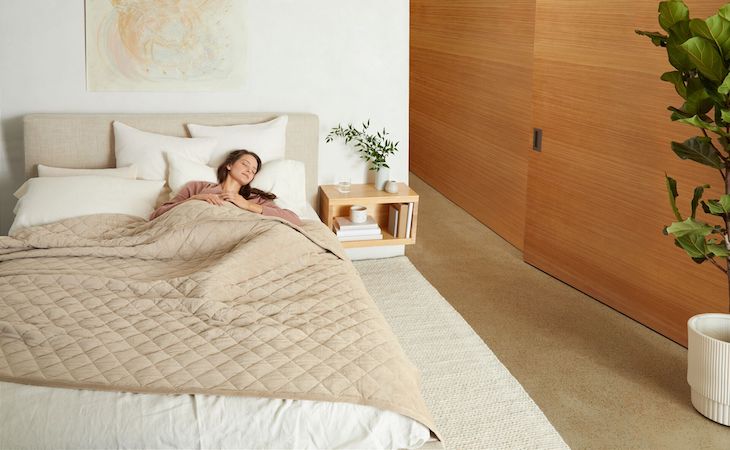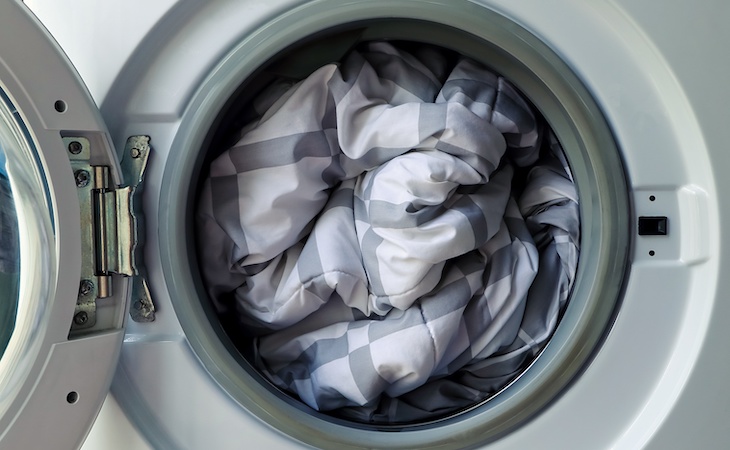Who doesn’t love a weighted blanket? Aside from the coziness of these blankets, they also promote better sleep and relieve stress thanks to their use of deep pressure therapy.
Yet, with all the good that comes from weighted blankets, you must find the right size to avoid an uncomfortable or potentially harmful experience from one that’s too heavy.
Here’s what you need to know about finding the right-sized weighted blanket for yourself and your kids (if you have them).
What size weighted blanket should I get?
You’ll need to do a little math to find the perfect size weighted blanket.
“A weighted blanket shouldn’t be more than 10% of the person’s weight,” says Hana Patel, a general health practitioner based in the UK. “If a different weight/size is recommended, the reason for this should be justified and recorded.”
Here’s a guide for finding the right weighted blanket size by body weight (lbs) and blanket weight (lbs):
- 120 lbs: 12 lbs
- 130 lbs: 13 lbs
- 140 lbs: 14 lbs
- 150 lbs: 15 lbs
- 160 lbs: 16 lbs
- 170 lbs: 17 lbs
- 180 lbs: 18 lbs
- 190 lbs: 19 lbs
- 200 lbs: 20 lbs
If you’re looking for a weighted blanket for your little ones, Patel recommends that they are “no more than 5% of the child’s body weight.”
Below is a kid’s guide for weighted blanket size by body weight (lbs) and blanket weight (lbs):
- 20 lbs: 3-4 lbs
- 30 lbs: 4-5 lbs
- 40 lbs: 5-6 lbs
- 50 lbs: 6-7 lbs
- 60 lbs: 7-8 lbs
- 70 lbs: 8-9 lbs
- 80 lbs: 9-10 lbs
- 90 lbs: 10-11 lbs
- 100 lbs: 11-12 lbs
Can a weighted blanket be too heavy?
A weighted blanket can have downsides if it’s too heavy. If you end up with a heavy weighted blanket that’s beyond your recommended size, you may experience overheating, difficulty breathing, joint and muscle pain, insomnia, and other sleeping problems.
Additionally, people with certain medical conditions may want to avoid using weighted blankets as they may worsen their symptoms.
A weighted blanket might be unsuitable for the following medical conditions:
- Asthma
- Low blood pressure
- Type 2 diabetes
- Claustrophobia
- Obstructive sleep apnea (OSA)
If you live with these conditions, please consult your healthcare provider before using a weighted blanket.
Also, if you have infants or toddlers, it may be best to avoid using weighted blankets or similar products altogether, as they may put them at risk of suffocation.
FAQs
What happens if you use a weighted blanket that’s too heavy?
For the most part, weighted blankets are safe to use if you have the physical strength to remove them if you feel uncomfortable.
However, aside from general discomfort, you might experience some unpleasant symptoms from using a weighted blanket that’s too heavy.
“If the blanket is too heavy, it may cause skin or soft tissue damage, redness, or bruising,” Patel explains. “If this happens, stop using immediately.”
Is it OK to sleep with a heavy weighted blanket?
According to Patel, you probably should ditch your weighted blanket when it’s time for bed. But if you’re willing to take the risk, be sure it’s not too heavy to remove at night if you get uncomfortable.
If you have children, Patel recommends not allowing them to sleep with a weighted blanket. “Weighted blankets should not be left on children overnight due to the risk of suffocating if they cannot independently free themselves,” she says.
Is it better to get a weighted blanket that’s too heavy or too light?
You’ll want to use a weighted blanket that accommodates your body and any health concerns, so it’s best to avoid blankets that are too light or heavy.
One that’s too heavy may cause health complications or worsen existing medical conditions. On the other hand, a lighter, heavy weighted blanket may not give you enough pressure to get better sleep and other benefits.
Is a 10-pound weighted blanket too heavy?
A 10-pound weighted blanket can be too heavy for any child weighing less than 90 pounds. However, this weighted blanket size is suitable for adults who are 100 pounds or more.
Find the best weighted blanket for you at Saatva
Now that you know better what to look for when it comes to weighted blanket sizes, grab our

Plush, all-natural weighted blanket for deeper, more restful sleep
for yourself or a loved one.
Our weighted blanket is available in two neutral tones, made with diamond-quilted cotton velvet, and has all-natural glass beads to give you gentle, even pressure as you rest.
You can choose a 12-pound throw or opt for a comfy 20-pound blanket that fits a queen- or king-sized bed.








